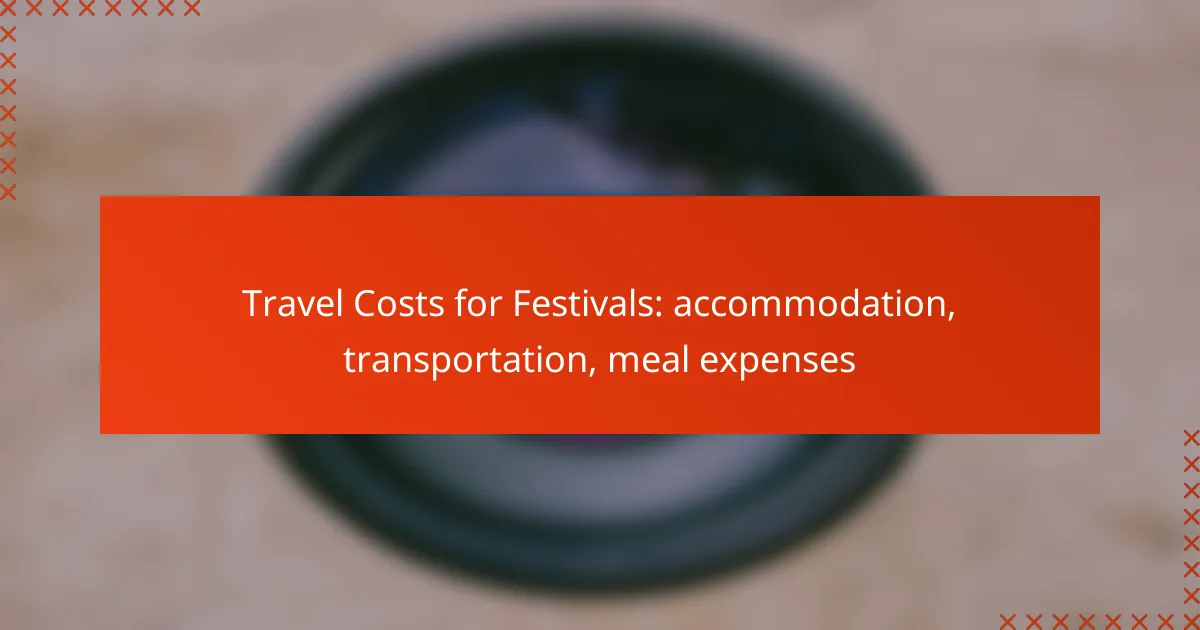Festival registration fees in Australia can range from AUD 50 to AUD 300, influenced by factors such as the event’s scale and location. To effectively manage your finances, it’s essential to create a budget that encompasses both registration costs and any additional expenses. Taking advantage of early bird discounts can also provide significant savings, encouraging attendees to commit ahead of time while assisting organizers in planning for attendance.
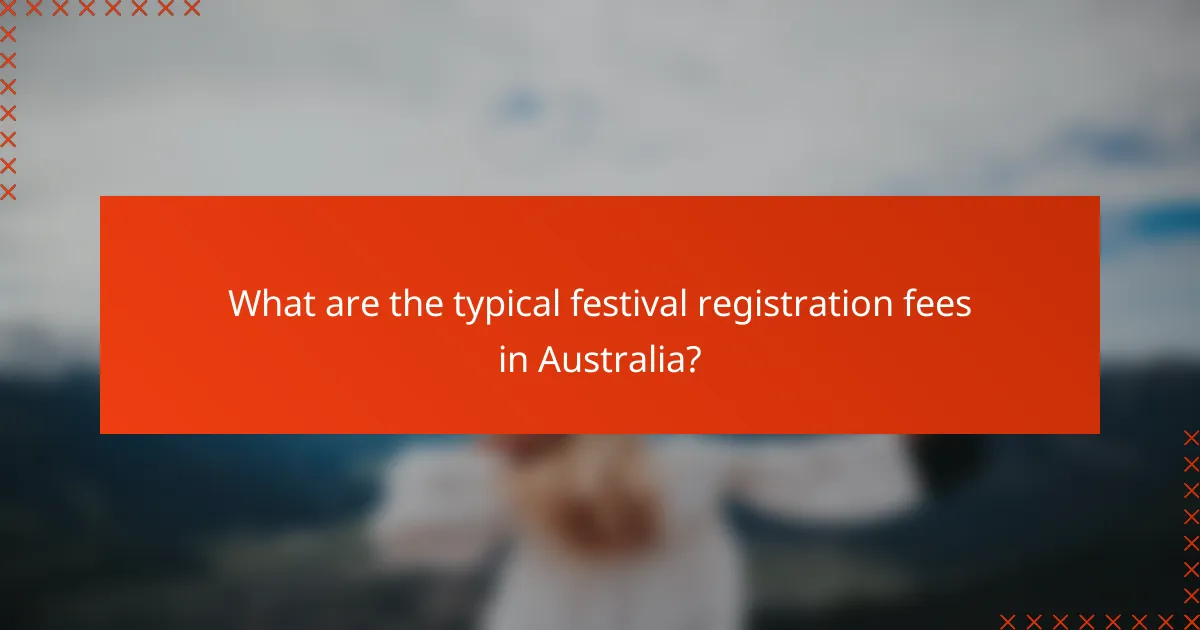
What are the typical festival registration fees in Australia?
Festival registration fees in Australia can vary significantly based on the event’s scale, location, and duration. Generally, attendees can expect to pay anywhere from AUD 50 to AUD 300 for standard entry, with some larger festivals charging more for premium experiences.
General fee ranges
Most festivals in Australia fall within a fee range of AUD 50 to AUD 300 for general admission. Smaller local events may charge lower fees, while major festivals can reach upwards of AUD 500 for VIP access or multi-day passes. Early bird discounts often provide savings of around 10-20% if purchased well in advance.
Factors influencing fees
Several factors can influence festival registration fees, including the festival’s location, the lineup of performers, and the duration of the event. Festivals in major cities like Sydney or Melbourne typically have higher fees due to increased operational costs and demand.
Additionally, the type of experience offered, such as general admission versus VIP packages, can also affect pricing. Early bird registration often allows attendees to secure lower rates, incentivizing early commitment.
Examples of major festivals
Some well-known festivals in Australia include the Sydney Festival, which typically charges between AUD 60 and AUD 150 for various performances, and the Melbourne International Comedy Festival, with fees ranging from AUD 20 to AUD 200 depending on the show. The Byron Bay Bluesfest is another example, where ticket prices can vary from AUD 100 for a day pass to over AUD 500 for a full festival experience.
These festivals often offer tiered pricing, allowing attendees to choose from different levels of access and amenities, making it essential to review options before purchasing tickets.
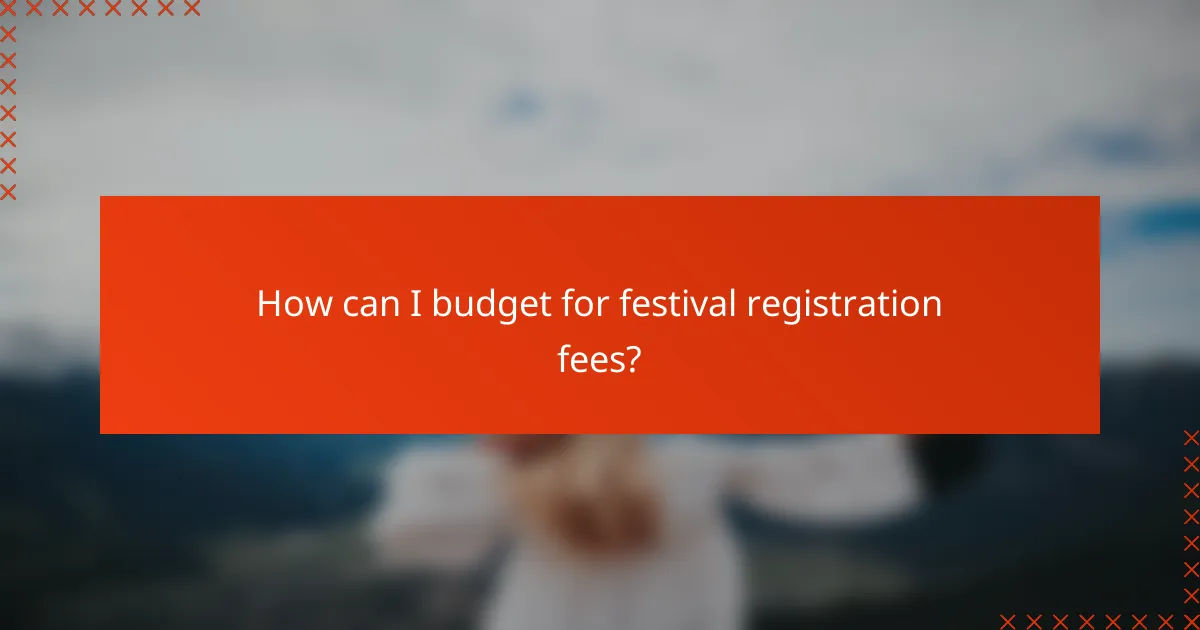
How can I budget for festival registration fees?
To budget for festival registration fees, start by estimating the total costs involved, including registration and additional expenses. A clear budget plan helps you allocate funds effectively and avoid unexpected financial strain.
Creating a budget plan
Begin by listing all potential costs associated with the festival registration. This includes the registration fee, travel expenses, accommodation, food, and any merchandise or activities you plan to participate in. Aim for a comprehensive view to ensure you don’t overlook any expenses.
Once you have a complete list, categorize these costs into fixed and variable expenses. Fixed costs, like registration fees, are predictable, while variable costs, such as meals and travel, can fluctuate. This categorization will help you manage your finances more effectively.
Identifying hidden costs
Hidden costs can significantly impact your overall budget for festival registration. Look beyond the obvious fees and consider additional expenses like parking, insurance, or service charges. These can add up quickly if not accounted for in advance.
To identify hidden costs, review past festival experiences or consult with others who have attended similar events. Create a checklist of potential hidden fees to ensure you are fully prepared. For example, include costs for convenience items or unexpected emergencies that may arise during the festival.

What are early bird discounts for festival registrations?
Early bird discounts for festival registrations are reduced fees available to attendees who register before a specified deadline. These discounts incentivize early commitment and help organizers gauge attendance numbers in advance.
Benefits of early bird registration
One of the primary benefits of early bird registration is cost savings, as attendees can often save a significant percentage compared to standard rates. Additionally, registering early can secure better access to limited resources, such as premium camping spots or exclusive workshops.
Another advantage is the peace of mind that comes with planning ahead. Early registrants can avoid last-minute stress and ensure their participation without worrying about sold-out events or price increases.
Examples of early bird discounts
Many festivals offer early bird discounts ranging from 10% to 30% off the regular registration fee. For instance, a festival with a standard ticket price of $100 may offer early bird tickets for $70 to $90, depending on how early you register.
Some festivals may also provide additional perks for early registrants, such as exclusive merchandise or VIP access. It’s common to see these discounts available for a limited time, often several months before the event, so it’s wise to check festival websites for specific details and deadlines.

What are the payment options for festival registration?
Festival registration typically offers several payment options to accommodate different preferences and budgets. Understanding these options can help you plan your finances effectively and ensure a smooth registration process.
Credit card payments
Credit card payments are one of the most common methods for festival registration. Most festivals accept major credit cards such as Visa, MasterCard, and American Express, allowing for quick and secure transactions.
When using a credit card, be aware of potential foreign transaction fees if registering for an international festival. Additionally, ensure that your card has sufficient credit limit to cover the registration fee, which can vary widely based on the event.
Payment plans
Many festivals offer payment plans to make registration more affordable. These plans typically allow you to pay the total fee in installments over a set period, making it easier to manage your budget.
When considering a payment plan, check for any additional fees or interest charges that may apply. It’s also wise to review the payment schedule to ensure you can meet the deadlines without financial strain.
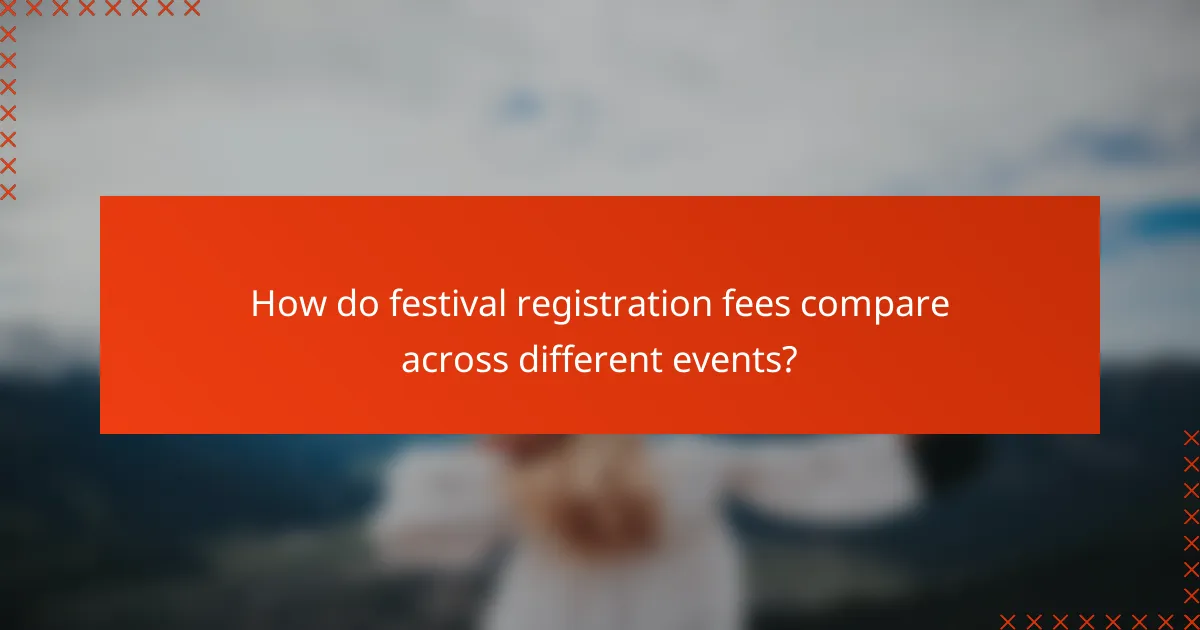
How do festival registration fees compare across different events?
Festival registration fees can vary significantly depending on the type of event, location, and timing of registration. Generally, larger festivals tend to have higher fees, while smaller or community-focused events may charge less.
Comparison of fees for major Australian festivals
In Australia, major festivals like the Sydney Festival and Melbourne International Comedy Festival typically charge registration fees ranging from AUD 50 to AUD 300, depending on the event’s scale and offerings. Smaller local festivals may have fees as low as AUD 10 to AUD 50, making them more accessible to a wider audience.
For example, the Woodford Folk Festival charges around AUD 400 for a full festival pass, while the Brisbane Festival offers various ticket options, often starting at around AUD 30. Early bird registrations can provide significant savings, sometimes reducing fees by 20-30% if purchased well in advance.
Factors affecting fee differences
Several factors influence the differences in festival registration fees, including the venue, duration, and the range of activities offered. Larger venues with extensive facilities and high-profile artists typically result in higher costs, while community festivals may operate on tighter budgets and lower fees.
Additionally, the timing of registration plays a crucial role. Early bird discounts are common, encouraging attendees to commit early, which can lead to savings. Conversely, last-minute registrations often incur higher fees, reflecting the increased demand as the event date approaches.
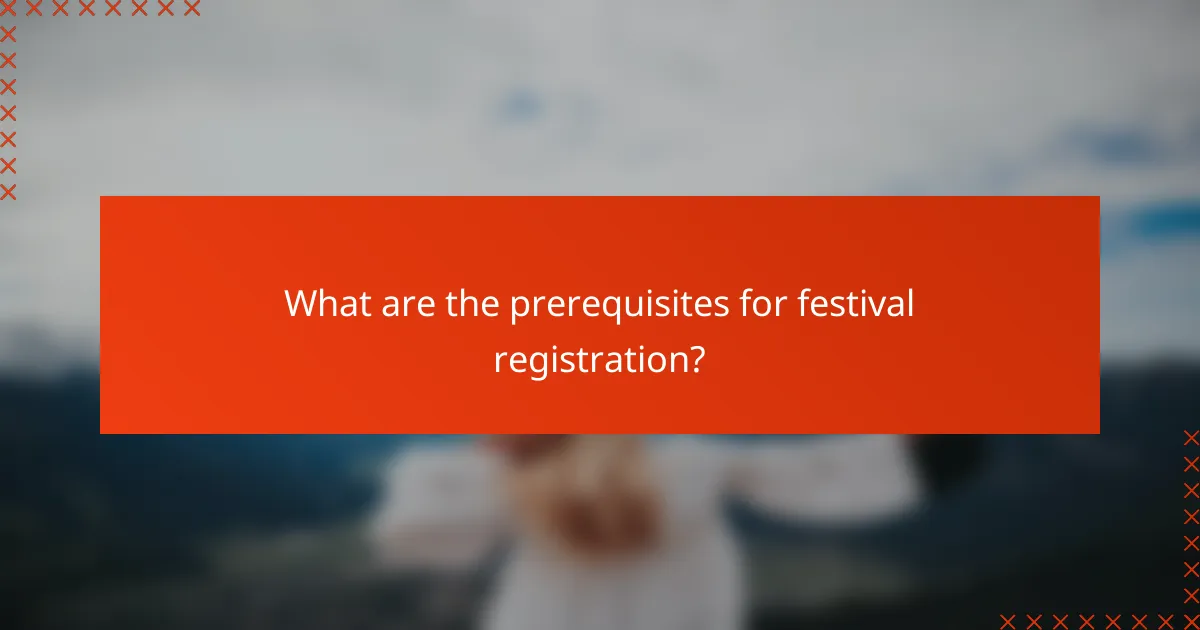
What are the prerequisites for festival registration?
Festival registration typically requires specific documentation and adherence to eligibility criteria. Understanding these prerequisites is essential for a smooth registration process.
Required documentation
When registering for a festival, you will generally need to provide several key documents. Commonly required items include proof of identity, such as a government-issued ID, and any necessary permits or licenses relevant to your participation.
Additionally, some festivals may ask for proof of insurance or a signed waiver. It’s advisable to check the festival’s official website for a detailed list of required documentation to avoid any last-minute issues.
Eligibility criteria
Eligibility for festival registration often depends on factors such as age, residency, and experience level. Many festivals have age restrictions, requiring participants to be at least a certain age, often 18 or older.
Some events may also prioritize local participants or those with specific skills or qualifications. Always review the eligibility criteria on the festival’s website to ensure you meet all requirements before applying.
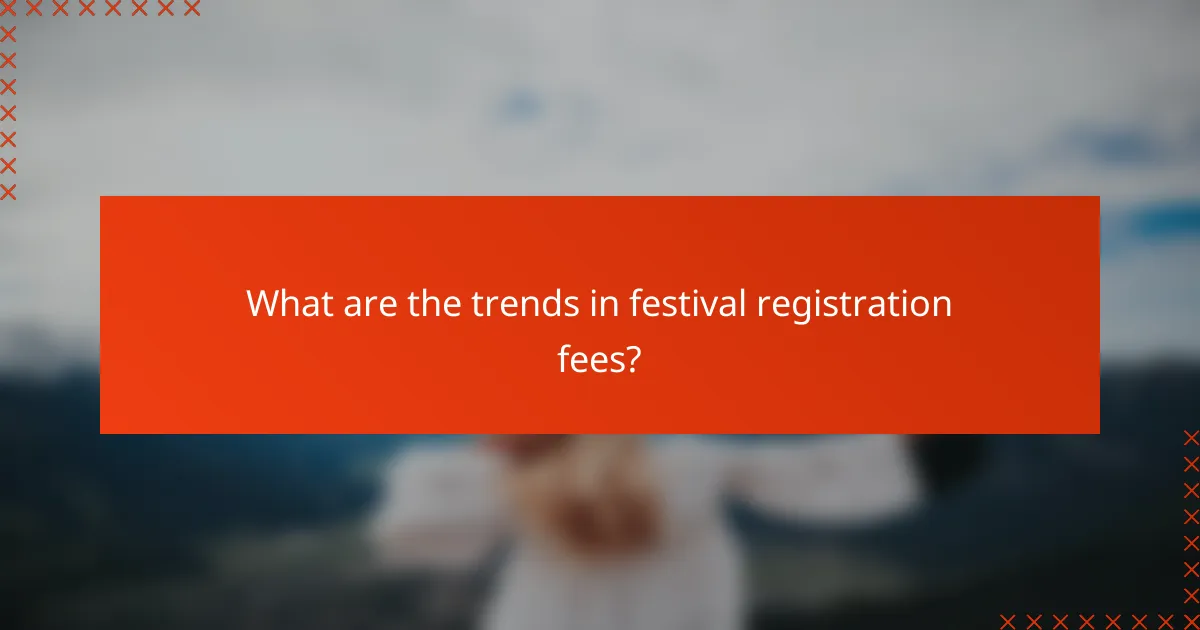
What are the trends in festival registration fees?
Festival registration fees are increasingly influenced by various pricing strategies and economic conditions. Understanding these trends can help attendees budget effectively and take advantage of potential savings.
Emerging pricing models
Many festivals are adopting tiered pricing structures, where early registrants enjoy lower fees compared to those who sign up closer to the event date. This model encourages early commitment and helps organizers gauge attendance.
Additionally, some festivals are experimenting with dynamic pricing, adjusting fees based on demand and ticket availability. This approach can lead to significant savings for savvy attendees who monitor prices closely.
Impact of economic factors
Economic conditions, such as inflation and local cost of living, directly affect festival registration fees. In regions experiencing high inflation, fees may rise more sharply, impacting overall attendance.
Moreover, fluctuations in currency exchange rates can influence international attendees. For example, a stronger euro against the dollar may make European festivals more expensive for U.S. visitors, prompting them to seek early bird discounts or alternative events.


